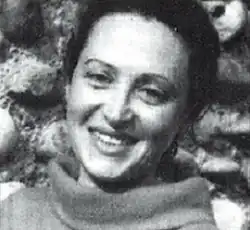Jacqueline Guerroudj
Jacqueline Guerroudj | |
|---|---|
 | |
| Born | April 27, 1919 |
| Died | January 18, 2015 (aged 95) |
| Other names | Jacqueline Netter-Minne-Guerroudj |
| Spouses | |
Jacqueline Netter-Minne-Guerroudj (27 April 1919 – 18 January 2015)[1] was a Frenchwoman condemned to death as an accomplice of Fernand Iveton during the Algerian War.[2] She was never executed, partly due to a campaign on her behalf conducted by Simone de Beauvoir.[3]
She was born to a well-off bourgeois family of Alsatian Jews in Rouen in 1919. She arrived in Algeria in 1948 as the wife of Pierre Minne, a professor of philosophy.[4] She remarried in 1950 to Abdelkader Guerroudj (nicknamed "Djilali"), an activist in the FLN. On 4 December 1957 Guerroudj's daughter by her first marriage, Danièle Minne, was sentenced to 7 years in prison by a tribunal for juveniles.[5] Guerroudj died on 18 January 2015 in Algiers, Algeria.
Biography
Jacqueline Netter was born on April 27, 1919 in Rouen, into a wealthy, bourgeois family. Her grandparents were Alsatian-Lorrain Jews who settled in Rouen at the time of the First World War. Her father was an insurance manager and general commissioner of the Rouen Fair and Exhibition. She studied philosophy and law.
She married Pierre Minne, a teacher like herself and a French Communist Party. Their daughter, Danièle Djamila Amrane-Minne, was born in 1939. In 1942, because of her Jewish origins, she was interned by the Nazism. Fortunately, with the help of her husband, communist activists and a priest, she managed to escape to the Zone libre and avoid deportation.
Jacqueline, her husband and their daughter moved to Senegal, where her husband, a civil servant in the French education system, was a philosophy teacher at the Collège de Slane in Tlemcen.[6] They were expelled in 1947 as a result of Pierre's anti-colonial militancy and his organization of Marxist philosophy circles.[7]
In 1948, the Minne family left to teach in Algeria. They settled in the Tlemcen region, first in Chetouane (then Négrier), then in Aïn Fezza where Jacqueline was a primary school teacher. Divorced, Jacqueline Netter remarried in 1950 to Abdelkader Guerroudj, an Algerian Communist Party activist and principal of the school where she taught. In April 1955, Jacqueline and Abdelkader Guerroudj were expelled for their activities. After spending a few months in France, they returned to Algiers and from January 1956 took part in the organization of the Combattants de la libération and Saadi Yacef network. She was arrested on January 4, 1957 for complicity in the non-lethal attempt on the life of Fernand Iveton, the only European moudjahid to be guillotined.[8] She was sentenced to death (like her husband) and poisoned in Rennes. She and her husband were pardoned, along with Djamila Bouazza and Djamila Bouhired, on March 8, 1962.
She was the oldest of six women sentenced to death for “terrorist” acts during the Algerian war. She was the oldest of six women sentenced to death for “terrorist” acts during the Algiers war.[9]
Published works
- Des douars et des prisons (in French). Bouchene. 1993. ISBN 9782841090037.
References
- ^ Jacqueline Guerroudj at the Bibliothèque nationale de France (in French)
- ^ "Décès de la moudjahida Jacqueline Guerroudj" (in French). Algerie Presse Service. 19 January 2015. Archived from the original on 2015-06-11.
- ^ Tidd 1999, p. 111.
- ^ Dore-Audibert 1995, p. 142.
- ^ Dore-Audibert 1995, p. 146.
- ^ Le combat de Djamila Danièle Amrane Minne pour la libération de l’Algérie
- ^ Danièle-Djamila Amrane-Minne (1939-2017), Moudjahida et historienne des moudjahidates
- ^ Luc Thiébaut. "Des militantes pour l'indépendance de l'Algérie incarcérées à Rennes" (PDF). Champs de Justice (in French).
- ^ "La moudjahida Jacqueline Guerroudj inhumée au cimetière d'El Alia, à Alger". Al Huffington Post.
Bibliography
- Dore-Audibert, Andrée (1995). Des Françaises d'Algérie dans la Guerre de libération: des oubliées de l'histoire (in French). KARTHALA Editions. ISBN 978-2-86537-574-5.
- Tidd, Ursula (1999). Simone de Beauvoir, Gender and Testimony. Cambridge University Press. ISBN 978-1-139-42660-2.